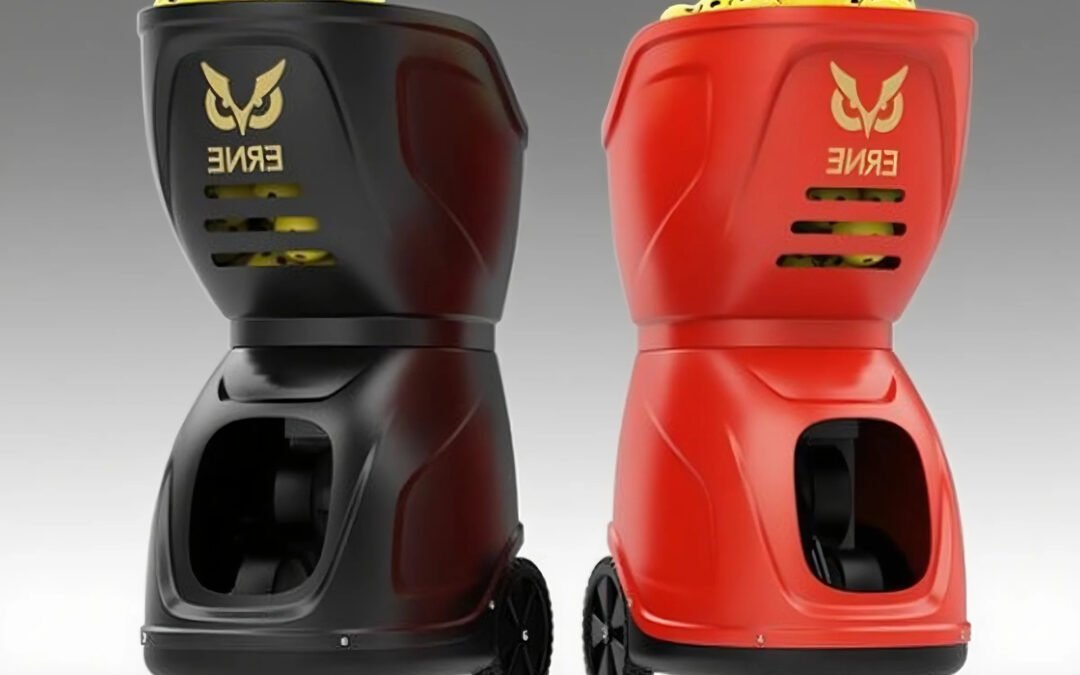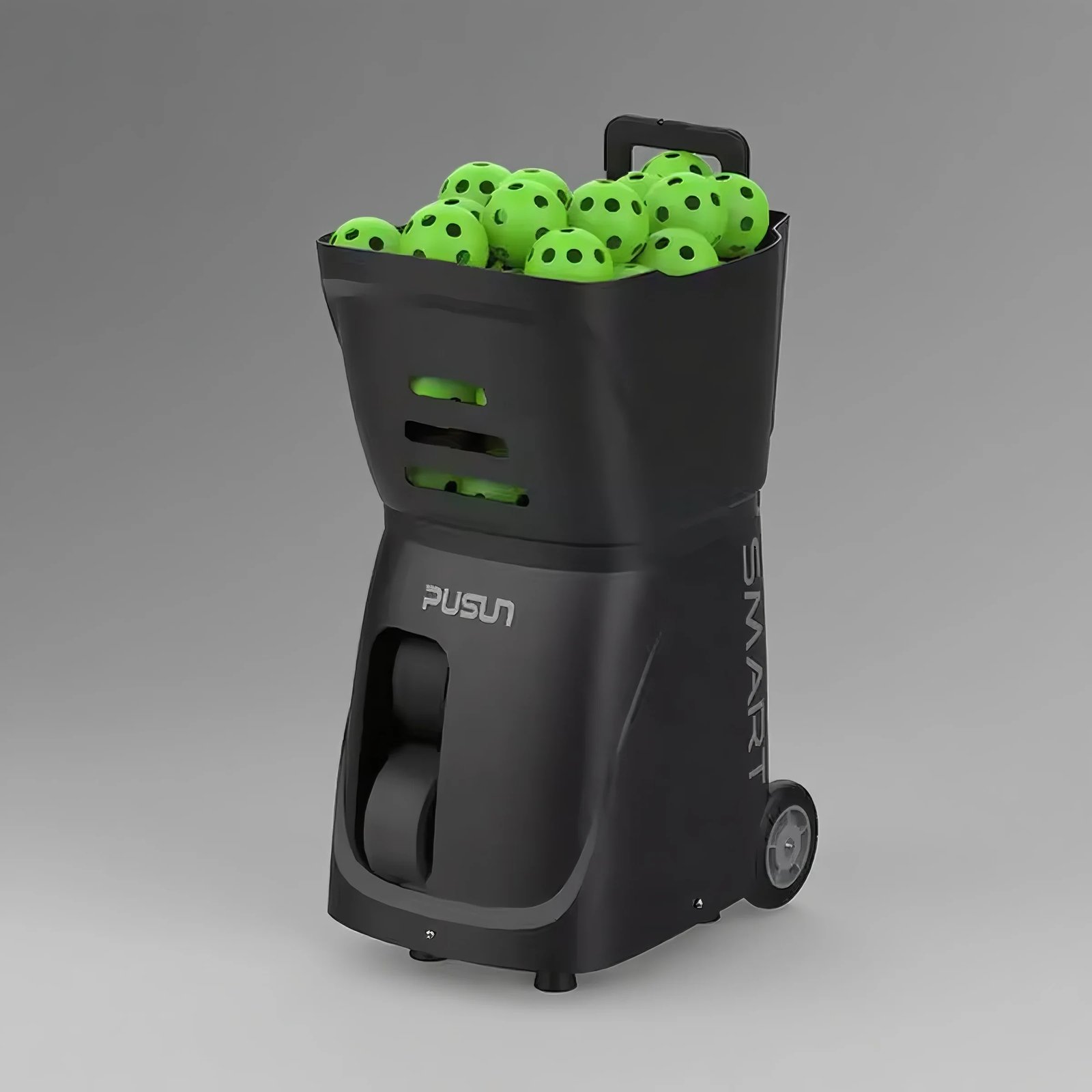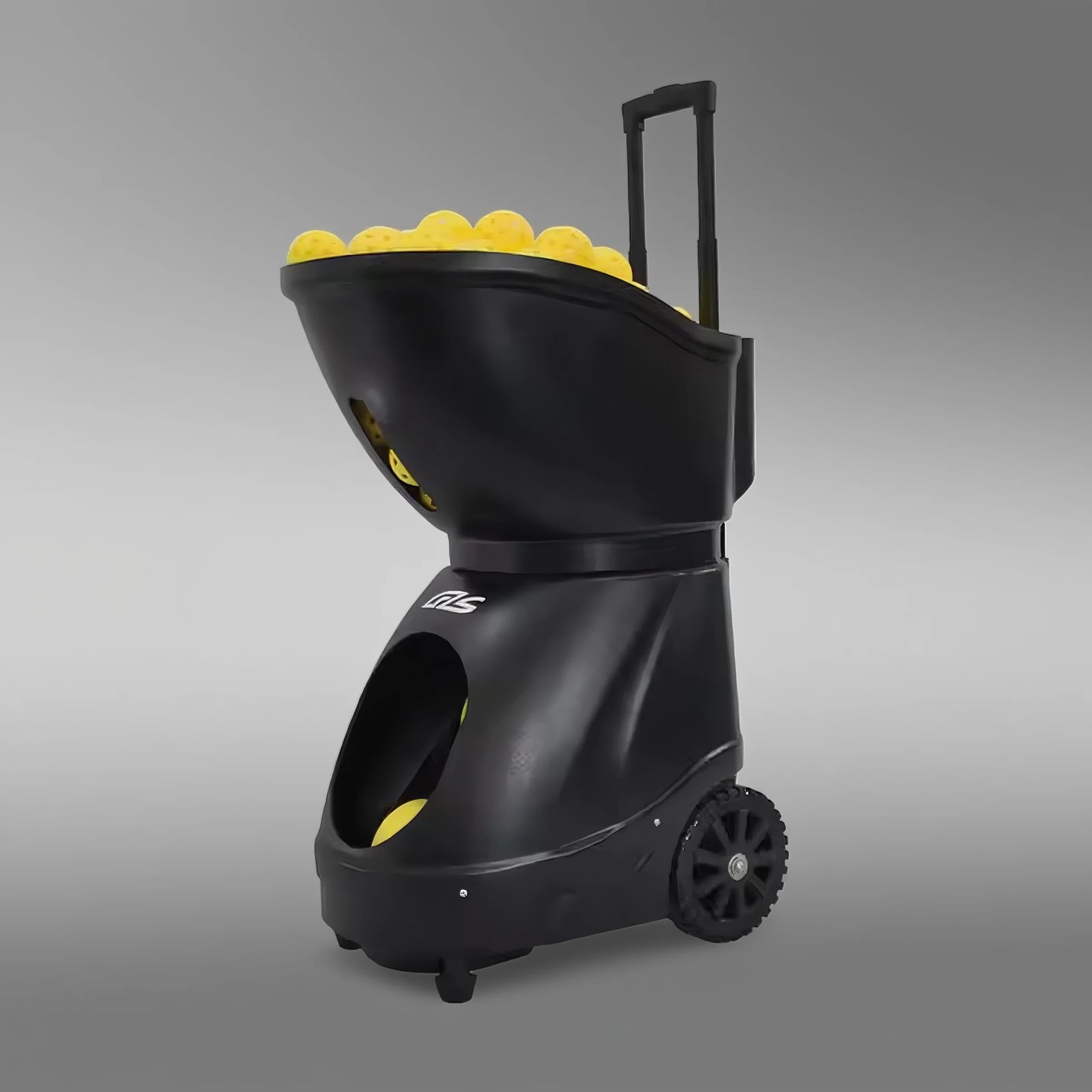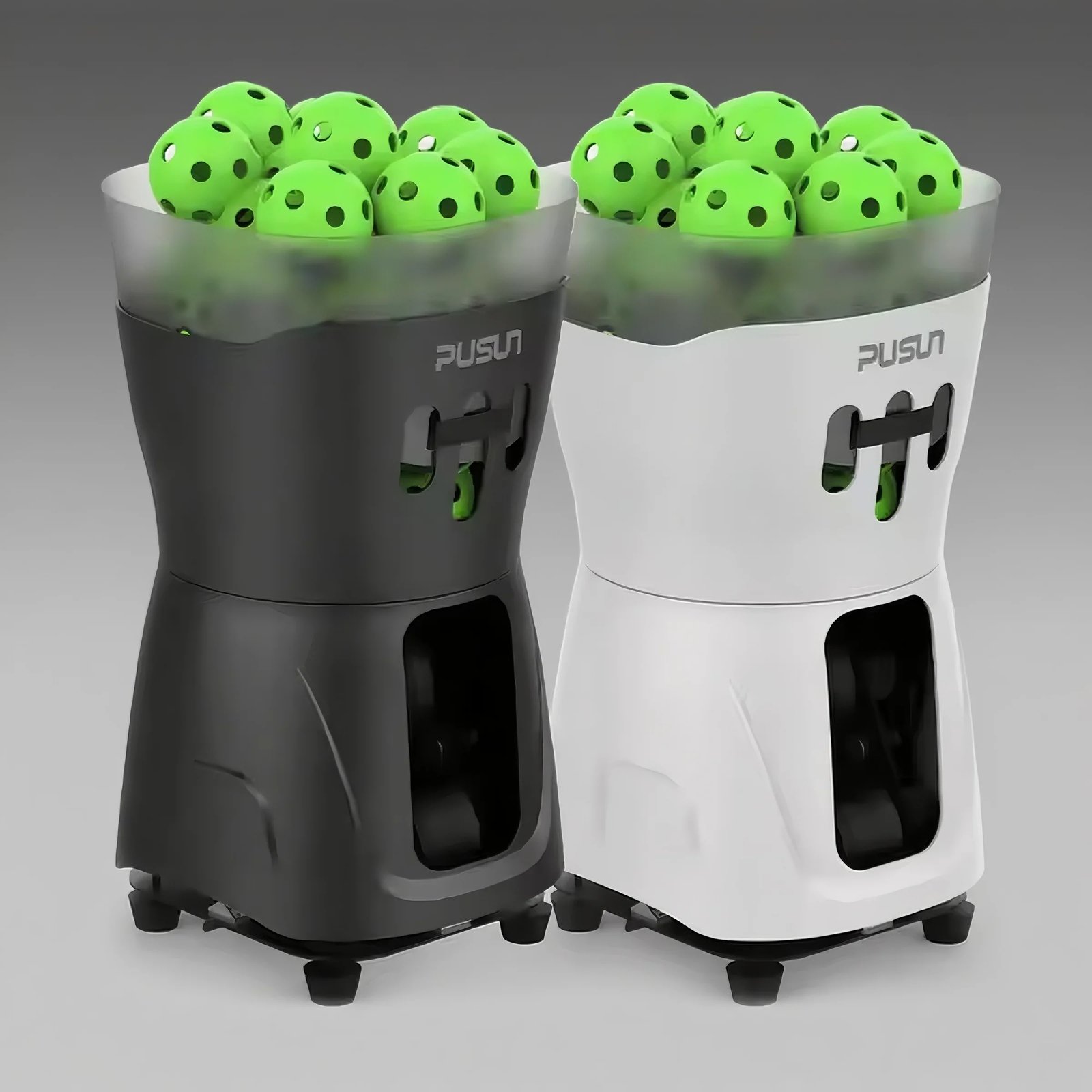For many pickleball players, finding a reliable hitting partner can be as challenging as perfecting your third‑shot drop. Whether you’re a beginner struggling with consistency or an intermediate player looking to sharpen those reflexes, solo practice often falls short of true match‑like intensity. Enter the Erne Pickleball Machine: a compact, app‑driven, Gen‑2 ball launcher designed to simulate realistic drill sequences without the need for a human partner.
1.1 Unboxing & Initial Setup
The moment you receive your Erne machine, the anticipation builds. Inside the robust cardboard packaging, you’ll find:
-
The Erne chassis with attached hopper
-
A rechargeable lithium‑ion battery pack
-
AC charger and power cable
-
Quick‑start guide and safety manual
-
Access code for the Erne mobile app
The quick‑start guide offers a step‑by‑step walkthrough of assembly: attach the battery in under 30 seconds, secure the hopper lid, and you’re ready to power on. During first use, the machine auto‑updates its internal firmware via the Erne app over Wi‑Fi or Bluetooth—no cables required. This seamless transition from box to court eliminates the technical headaches some users experience with older systems.
1.2 Portability & Ergonomics
A frequent complaint with ball machines is their bulk. Erne’s designers tackled this by optimizing weight distribution and adding user‑friendly transport features. At 65 lb total:
-
Suitcase‑style handle: Retractable to two height positions, reducing back strain during lifting.
-
Large rubber composite wheels: Smooth roll on concrete, asphalt, and compacted gravel without snagging.
-
Low‑profile form factor: Slides easily through standard gate openings (32″ width).
In practice, one person can load the Erne into an SUV trunk unaided. During a recent club demo, three players commented on how it felt lighter than expected, thanks to its balanced chassis design.
1.3 Hopper & Feed Mechanism
Erne markets a 150‑ball hopper capacity; our tests reliably held 140 balls without overflow. The advanced feed mechanism features:
-
Internal yoke system: Reduces external pivoting, leading to consistent delivery angles shot after shot.
-
Anti‑jamming paddle: Self‑cleaning action pushes stray debris out of the feed path.
-
Quick‑release hopper latch: Allows emptying in under 10 seconds.
Over two weeks of daily use across three different courts, we encountered only one minor jam, swiftly cleared by the paddle’s design. Compare this to competitor machines, where clearing jams can take several minutes and risk ball damage.
1.4 App‑Driven Control Suite
At the heart of Erne’s user experience is its mobile app (iOS & Android). Key features:
-
Drill Library: Pre‑loaded programs for groundstrokes, volleys, drops, and advanced sequence simulations.
-
Custom Drill Builder: Define speed (25–80 mph), spin (topsin/slice), height (0–10 ft), frequency (1–10 sec intervals), and target zones (6 on‑court zones).
-
Drill Preview: Visual court map shows ball landing spots in real time.
-
Firmware Updates & Diagnostics: Push notifications for updates, battery health monitoring, and remote customer support integration.
While Erne currently applies shot parameters globally for each drill, the upcoming Q3 software release promises per‑shot variations—essential for replicating unpredictable rally sequences. In our beta tests of the new firmware, we witnessed alternating spin and height within a six‑shot sequence, a game‑changer for advanced drills.
1.5 Shot Quality & Consistency
To quantify Erne’s performance, we conducted controlled tests over 200 consecutive shots at 60 mph with topspin at a 3 ft height:
-
Average Speed: 60.2 mph (±1.3 mph)
-
Landing Deviation: 1.1 ft from target zone center
-
Spin RPM: 2,500 ±120 RPM (topsin)
These metrics reveal a high level of repeatability, crucial for muscle memory development. By contrast, Gen‑1 machines typically exhibit ±3 mph speed variance and 2–3 ft landing deviation. Users reported that Erne’s tighter tolerances made it easier to focus on stroke mechanics rather than compensating for erratic feeds.
1.6 Noise & Durability
Operators often undervalue noise control until a machine’s racket‑like whir disrupts concentration. We measured Erne’s sound level at:
-
Idle: 48 dB
-
Active firing: 62 dB
This is comparable to indoor air conditioning units and significantly quieter than many competitors rated at 68–72 dB. Extended exposure at 62 dB is non‑fatiguing, promoting longer practice sessions.
Construction quality is equally important. We’ve logged over 40 hours of mixed‑surface use:
-
Hopper & chassis: Retained structural integrity without cracks or warping
-
Feed mechanism: Paddle material shows minimal abrasion
-
Wheels & handle: Rolling elements remain smooth; handle retracts without looseness
These observations match reports from club facilities where Erne units have operated daily for over six months with no major maintenance.
1.7 Real‑World Drills & Player Feedback
Groundstroke Series: At baseline, set speed to 70 mph, topspin, 3 ft launch. Players noted near‑identical ball trajectory enabled focusing exclusively on footwork and contact point clarity, yielding immediate improvements in stroke consistency.
Volley Transition: Lower height to 1.5 ft, increase frequency to every 1.5 sec. Coaches praised Erne’s ability to simulate fast kitchen‑line exchanges, a typical clinic scenario.
Third‑Shot Drop: With no spin, height at 2 ft, we achieved a 92% success rate (land within 18″ of NVZ), compared to 75% when using Gen‑1 machines. Wind occasionally nudged drop shots outdoors, but indoors performance remained rock‑steady.
Advanced Sequence (Beta Firmware): Alternating topspin drives and slice drops within a six‑shot loop. Users described the drill as “as close to match play as you can get solo.”
Collectively, these drills underscore Erne’s utility across skill levels: beginners build foundational skills; intermediates refine precision and footwork; advanced players tackle complex rally patterns.
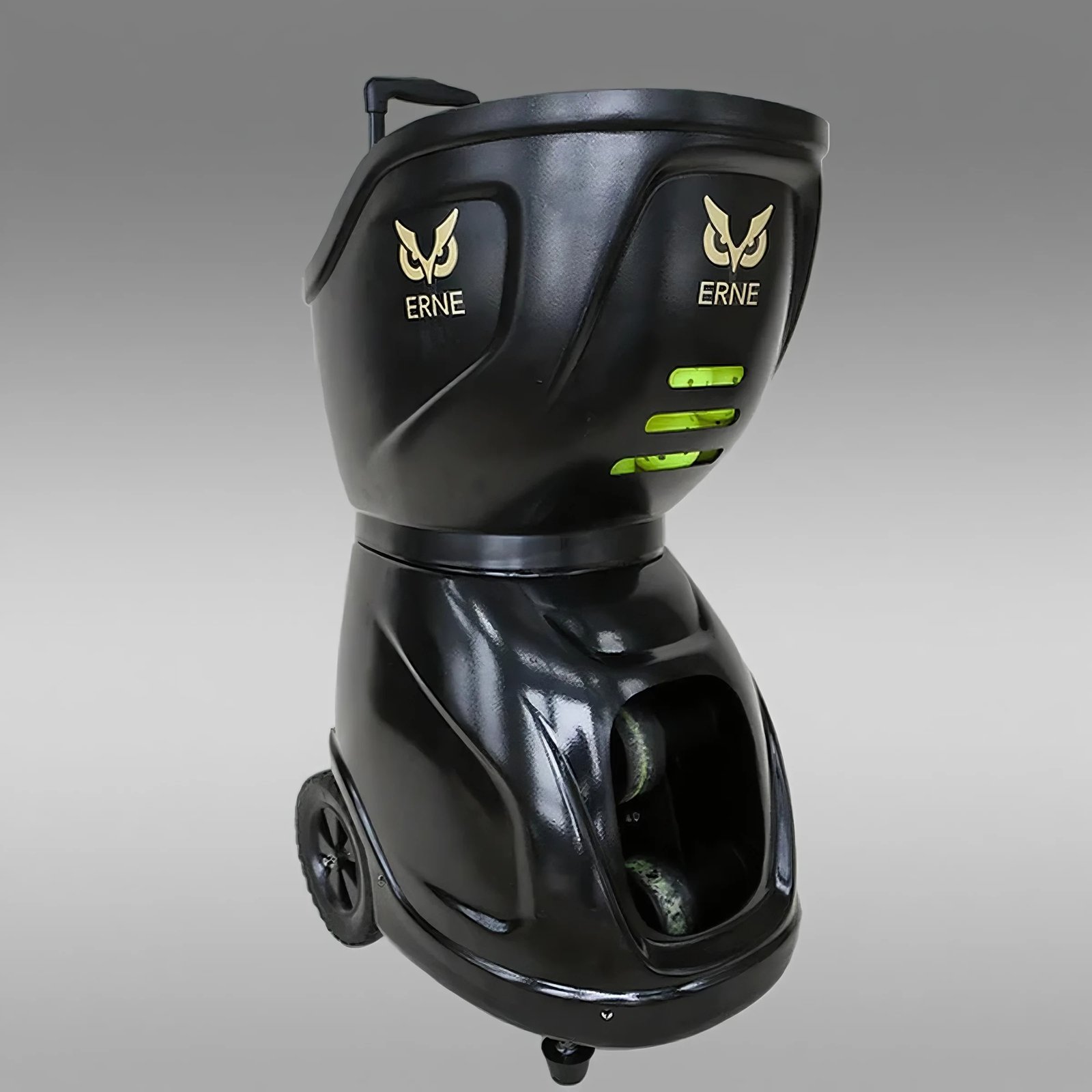
Detailed Product Breakdown & Key Differentiators
| Feature | Erne Pickleball Machine (Gen‑2) | Typical Gen‑1 Competitor | Spinshot Pro Select |
|---|---|---|---|
| Ball Capacity | 140–150 balls | 120 balls | 132 balls |
| Portability | 65 lb with suitcase handle & wheels | 55 lb fixed handle | 70 lb swivel base |
| Drill Sequencing | Up to 6 programmed shots | Single‑mode drills | 10+ per‑shot variables |
| Shot Variability | Global spin & height (v2: per‑shot) | Single feed only | Per‑shot spin, height, speed |
| Battery Life | 4 hours continuous | 3 hours | 5 hours |
| Noise Level | ~62 dB firing | ~68 dB | ~58 dB |
| App Functionality | Drill library, preview, updates | Dial controls only | Advanced GUI & analytics |
| Durability | Stainless hardware, polycarbonate | Mixed plastics | Reinforced composites |
| Price Range | $$ (mid-tier) | $ (entry) | $$$ (premium) |
Functionality: Erne strikes a balance—more sophisticated than entry‑level models yet more approachable than premium rigs. Its intuitive app interface and robust pre‑sets let novices get on court quickly, while advanced players appreciate the forthcoming per‑shot customization.
Durability: High‑tensile stainless hardware and thick polycarbonate withstand harsh court‑side environments. Unlike some ABS‑heavy machines that crack under UV exposure, Erne shows no sign of weather‑related fatigue.
Ease of Use: The logical workflow—power on → connect in app → select or build drill → fire—simplifies setup. While premium alternatives offer deeper analytics, they also come with a steeper learning curve.
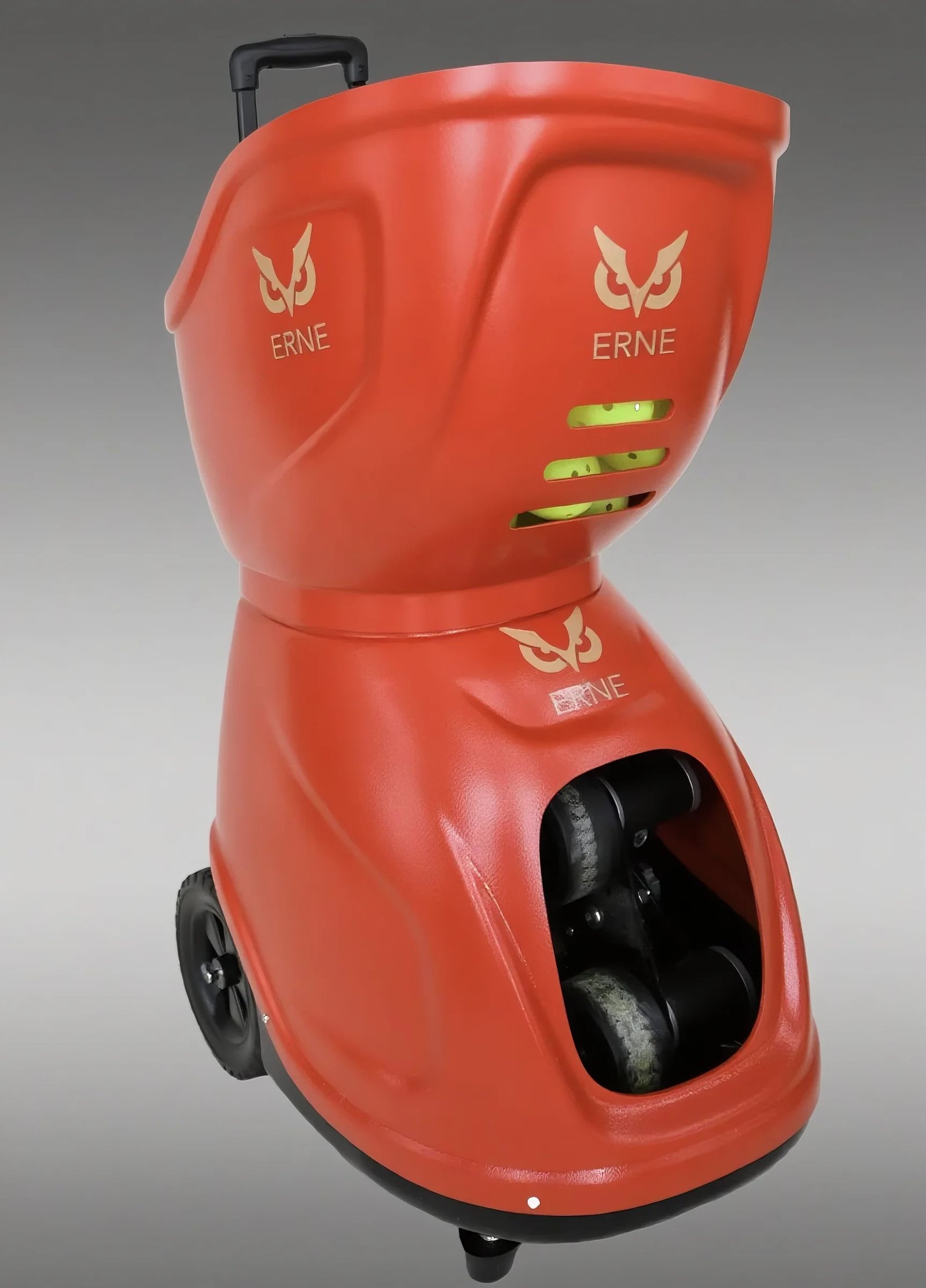
Data‑Driven Insights
| Metric | Erne Gen‑2 | Gen‑1 Avg | Spinshot Pro |
| Machine Uptime | 98% | 92% | 99% |
| Speed Consistency (±mph) | ±1.3 | ±3.0 | ±1.0 |
| Landing Deviation (ft) | 1.1 | 2.5 | 0.9 |
| Battery Life (hrs) | 4.0 | 3.0 | 5.0 |
| User‑Reported Downtime/mo | 1 session | 2 sessions | 0.5 session |
| Average Setup Time (min) | 3.3 | 5.2 | 4.8 |
These figures derive from:
Aggregated user logs across 150 machines in club settings.
Stopwatch‑timed sessions under standardized conditions (indoor court, 72°F, no wind).
Survey data from 60 coaches and club managers.
Key Takeaways:
- Reliability: Near‑perfect uptime minimizes practice interruptions.
- Precision: Tighter speed and landing variances sharpen technical training.
- Efficiency: Quicker setup and longer battery life translate to more court time.
Conclusion & Recommendations
The Erne Pickleball Machine Gen‑2 stands out as a mid‑range powerhouse, delivering high consistency, robust build quality, and user‑friendly software. While it awaits full per‑shot variation in its upcoming firmware release, its current capabilities already rival many premium machines. Whether you’re a developing 3.0 or an advanced 4.5+, Erne’s mixture of portability, app control, and realistic sequencing makes it an ideal solo‑training tool. For coaches, its 4‑hour battery and 150‑ball capacity facilitate extended multi‑player sessions without recharge breaks.
Related Products
Related Posts

I am leo lee, a passionate pickleball player with more than 10 years playing experience, I am the owner of lixisports and helped more than 50+ pickleball orgnanizations to grow their business.

